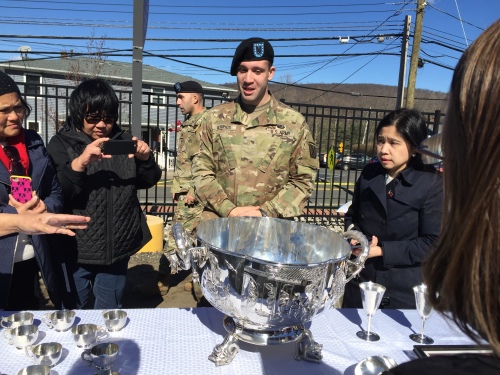I attended the Battle of Bataan / Bataan Death March commemoration in Orangeburg, NY, yesterday, which my uncle, Jerry Kleiman, organized single-handedly. It’s the 75th anniversary of this historic event in which thousands of Americans and Filipinos died. The 31st Infantry Regiment came down from Fort Drum to attend and brought their famed Shanghai Punch Bowl, which had been buried in Bataan during WWII. The singer Joe Bataan, who was named after the battle (and who would have been named Corregidor if he were a girl), gave a stirring performance. Several politicians and religious, military, and civic leaders made powerful speeches, and 4 WWII veterans (including my grandfather, Irving Kleiman) introduced themselves.

The Shanghai Punch Bowl
Afterwards there was a symposium at Dominican College. Joseph Laurent Chabot, the son of a Bataan Death March survivor, spoke about his father’s ordeal. Both he and his father were West Point graduates. His father was held in a POW camp in the Philippines for most of the war. He said the only reason his father, Joseph Ludger Chabot, wasn’t put on a Japanese “hell ship” was because he was too sick to walk to the vessel. One of his father’s friends, who was put on a hell ship, was owed some mung beans and designated Joseph as the person who should receive his share of beans. This little bit of extra nutrition may have saved his life.
Sherman Fleek, military historian from West Point, spoke about Filipino West Point graduates who served with honor in Bataan, and the importance of memory.
Dr. Scott White, a historian from Dominican College, spoke about the Native American soldiers from the American Southwest who served in Bataan. He told the story of one Navajo soldier who was in a POW camp in Bataan (not sure of his name). The Japanese had realized that the U.S. was using Native American code talkers, although at first they thought there was only one Native American language. I’m not sure how/ if they realized Navajo was being used. They started looking for Navajo speakers in the POW camps and torturing them to break the code. They sent this Navajo soldier to Nagasaki for more specialized torture, doing things like making him stand outside until his feet froze to the ground and driving a nail into his head. He left Nagasaki only a few days before the bomb was dropped. After the war, he received extensive medical treatment in Hawaii and California before returning home. He (and other Navajo survivors) went through a lot of ceremonies to purify their spirit, and it was hard to get them to talk about their experiences because of their beliefs about the spirits of the dead. Dr. White also gave an example of the code, saying the Navajo words for bee, tea, etc., and explaining that the first letters of each word stood for or made the sounds of “Bataan.” (By the way, I think this story would make a great book and/ or movie. Unfortunately I don’t have the expertise to write it.)
After the talks, a WWII veteran in the audience stood up and spoke for 10 minutes. He had served in the Philippines, near Luzon, and was 19 at the time. He spoke about working to construct a camp for the POWs after they were released, putting up tents and a long row of latrines. He said that when the POWs arrived in trucks, they were so weak and malnourished that they had to be carried out. Their arms and legs were like bones, and their stomachs were distended. They seemed happy to be there, although embarrassed they had lost the battle. He and the other Americans “took care of them,” telling them not to eat too much because they would throw it up. But they threw up anyway, and had massive diarrhea.
One more interesting point, mentioned by Jerry and others: Bataan Road (in Camp Shanks in Orangeburg, where this commemoration took place) was named in 1942, before the Death March became publicly known in 1944. Bataan was a rallying cry for the Americans long before people knew about the Death March. An escapee from the Bataan POW camps wrote about it in 1944, but he died in a military accident before the book came out.
P.S. – Sorry if I got any of this information wrong; I didn’t do much fact-checking, but wanted people to know about this important event.





